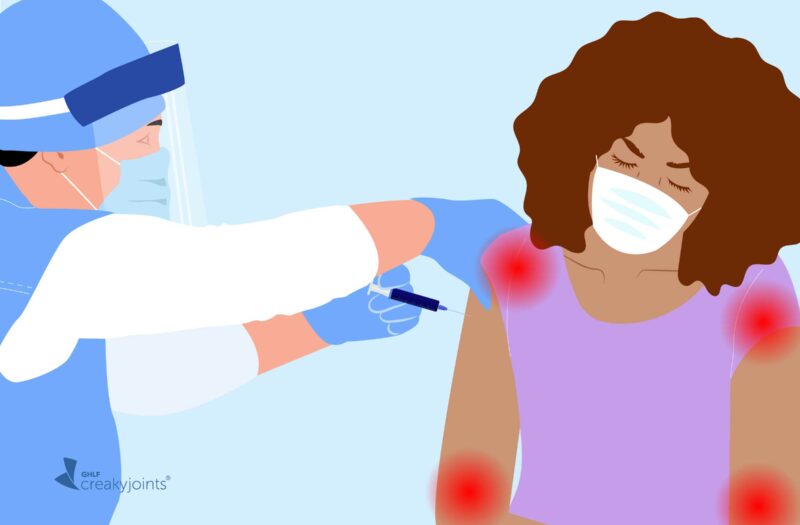Learn more about our FREE COVID-19 Patient Support Program for chronic illness patients and their loved ones.
Key Takeaways
- Previous research has shown that immunosuppressing medications such as methotrexate, glucocorticoids, and rituximab can decrease the immune response to the COVID-19 vaccines.
- Patients taking immunosuppressing medications can reduce COVID risk by nearly 60 percent by getting fully vaccinated and receiving booster shots.
- Check in with your doctor to make sure you’re doing all you can to protect yourself against COVID.
Vaccine effectiveness has understandably been a major point of interest (and concern) for immunocompromised individuals, who may not garner as robust of a response to the COVID-19 vaccine as those who are immunocompetent. Now, new research has quantified how effective the vaccines are in real-world settings.
In a study published in the Annals of the Rheumatic Diseases, researchers analyzed the medical records of more than 150,000 people in the University of Michigan’s health care system. They found that fully vaccinated people taking immunosuppressants (including disease-modifying antirheumatic drugs and glucocorticoids) are not as protected from COVID-19 as the general population not taking immunosuppressive therapy – but that vaccination still benefits these patients, especially when they receive a booster dose.
Among those taking immunosuppressants, the risk of infection was reduced by 45 percent in individuals who received the Pfizer, Moderna, or Johnson & Johnson vaccines. This study was the first to show that the Moderna vaccine is as effective as the Pfizer vaccine in this patient population.
“The reduction should be more than 45 percent for Pfizer and Moderna, since mRNA vaccines are more effective than Johnson & Johnson’s vaccine,” adds Lili Zhao, PhD, a research associate professor at University of Michigan School of Public Health and one of the authors of the study.
Meanwhile, among those taking immunosuppressants, the risk of infection was reduced by 58 percent in individuals who received a Pfizer or Moderna booster shot compared to those who received just two doses.
These findings drive home the importance of getting fully vaccinated and receiving your booster shots, even if you are immunocompromised.
“Nothing surprises me [about the findings],” says Dr. Zhao. “It is important for these people to take a booster dose.”
Previous research has shown that medications such as methotrexate, steroids like glucocorticoids, and rituximab can decrease the immune response to the COVID-19 vaccines.
In fact, one July 2021 study also published in the Annals of the Rheumatic Diseases found that only 39 percent of patients taking rituximab developed antibodies after two doses of an mRNA vaccine, compared to the healthy controls. (For more on this, here’s a round-up of research on COVID-19 vaccines in rheumatic disease patients.)
If you are immunocompromised and already received an additional third dose as part of your initial series, you may now be eligible to receive a fourth dose as a booster. Talk to your doctor to ensure you’re receiving all COVID-19 vaccine doses you’re eligible for to protect yourself against infection.
Get Free Coronavirus Support for Chronic Illness Patients
Join the Global Healthy Living Foundation’s free COVID-19 Support Program for chronic illness patients and their families. We will be providing updated information, community support, and other resources tailored specifically to your health and safety. Join now.
Interview with Lili Zhao, PhD, a research associate professor at University of Michigan School of Public Health.
Mrak D, et al. SARS-CoV-2 vaccination in rituximab-treated patients: B cells promote humoral immune responses in the presence of T-cell-mediated immunity. Annals of the Rheumatic Diseases. July 20, 2021. doi: http://dx.doi.org/10.1136/annrheumdis-2021-220781.
Shen C, et al. Efficacy of COVID-19 vaccines in patients taking immunosuppressants. Annals of the Rheumatic Diseases. February 23, 2022. doi: https://doi.org/10.1136/annrheumdis-2021-222045.






